Making Glory Hunters Part 1: Imagining the Experience
How Glory Hunters Was Made, Part 1: Imagining the Experience
I’ve always seen a game designer as someone who creates experiences. The designer is the one who makes the “toys” that we later have fun with through the screen. They define the elements, rules, controls, and restrictions of the game and then offer them to the player, who transforms those “toys” into something personal.
During the development and after the release of Glory Hunters, several people asked me where the idea came from or how I began making the game. This reaffirms what I’ve always thought: everything started with the experience I wanted to have as a player—a blend of many video games that shaped me and key ideas that laid the foundation for the game’s structure.
In this devlog, I’ll describe the concepts behind the experience I aimed to create, where they came from, and how they ultimately integrated into the game. The purpose of sharing this information is to open the door to what was going on in my mind during development and share the elements that were implemented so other developers can evaluate what worked and what didn’t. Although Glory Hunters is far from a perfect game, I firmly believe these ideas can be expanded, balanced, and enriched to potentially form the basis for a new subgenre in action-adventure RPGs.
A Video Game Unfolding Through Achievements
Main idea: A video game that reveals itself through the acquisition of achievements.
For many years, I played World of Warcraft (more than I’d like to admit), and one of the things I enjoyed most was earning achievements. Achieving and showing off these accomplishments to other players was incredibly satisfying. One particular achievement, “Insane in the Membrane,” took me a long time to complete. When future expansions devalued that achievement, it was one of the reasons I stopped playing.
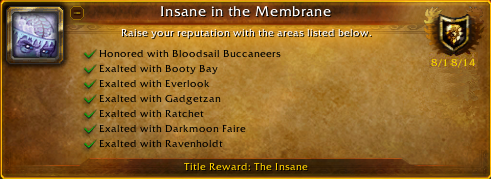
This concept of achievements deeply influenced Glory Hunters. At first, I wanted NPCs to stop referring to the player as a “hunter,” and for the title used by NPCs to change depending on the achievements you earned. But I eventually scrapped that idea because it would have been too complicated to implement across all the game’s dialogue, not to mention the technical limitations of the hardware. However, it remains something I’d like to implement in a future remake or sequel, if possible.
The achievement system is at the heart of Glory Hunters, but what makes the game unique is that it’s not limited to the typical checklist of “missions” or “tasks” to complete. I wanted each player to have the freedom to decide how to earn those achievements, whether through exploration, solving puzzles, interacting with NPCs, or even performing simple actions like cutting bushes or fishing. This way, achievements weren’t just a recognition of progress; they also defined who you were as a player.
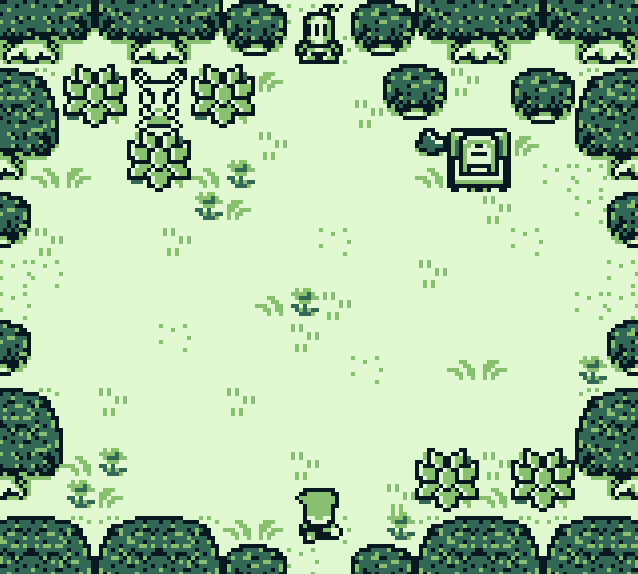
Mechanics That Helped Achieve This: Keeping a Counter for Every Action Taken by the Player Using Variables
Before starting the development of Glory Hunters, I experimented with a prototype called Blind Rabbit, a small project where I played with the idea of using variables to track every player action. This prototype allowed me to implement a system where NPCs could die or disappear after a certain number of interactions. Every action the player took had a hidden counter, and this allowed me to see the potential of creating a game where every little decision the player made would have an impact on the world.
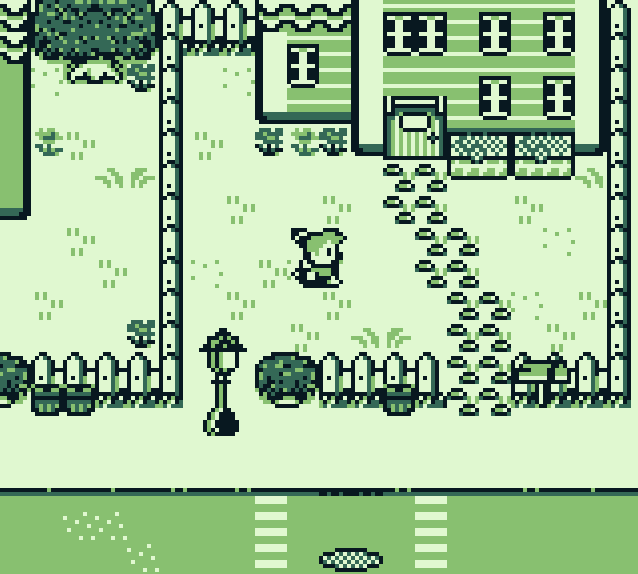
While Blind Rabbit never became something bigger, it laid the groundwork for what would come in Glory Hunters. Using variables allowed me to keep detailed records of everything the player did, from cutting bushes to talking to NPCs. This system was key to implementing the achievement mechanic and creating a world that responded to the player’s choices, no matter how small.
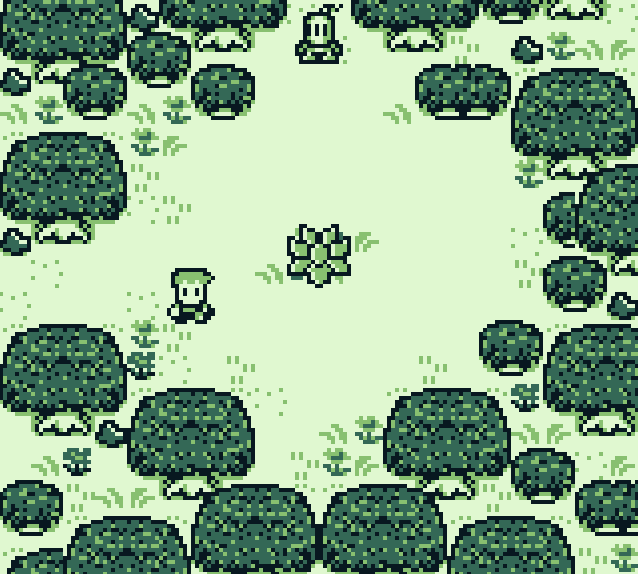
Breaking Free from Traditional RPG Restrictions
Main idea: A video game where everything (or the vast majority of events or locations to discover) could be optional.
One of the aspects I wanted to change from traditional RPGs was how game restrictions forced you to follow a predetermined path. In many cases, although freedom was promised, you were actually tied to specific abilities, items, or quests that you had to complete in order to progress. I wanted Glory Hunters to break away from this structure, giving players more freedom.
While there are restrictions in the game, they can be overcome in multiple ways. I didn’t want the player's progression to depend on defeating a boss or completing a specific dungeon. Instead, I wanted you to be able to earn achievements simply by exploring, talking to NPCs, completing side quests, or even doing smaller activities like fishing or cutting bushes. This flexibility gives the player the freedom to choose how they progress, shaping their unique experience.
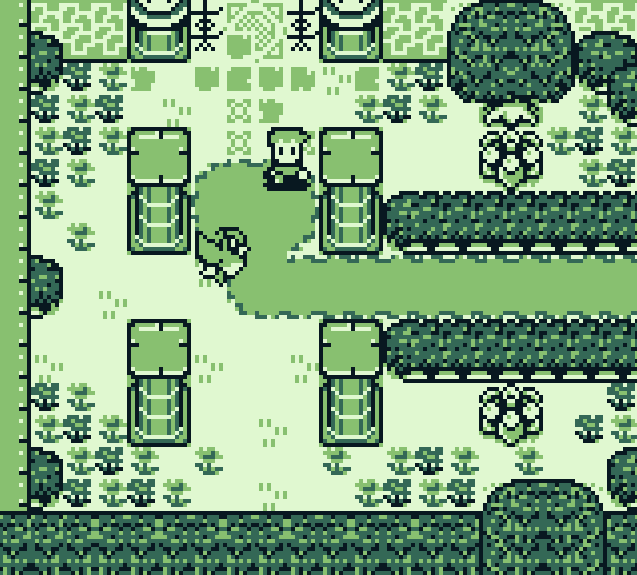
Players aren’t restricted by specific skills or items. In Glory Hunters, you can open new routes by paying guards, but this comes with a decision: unlocking one path means the other will be more challenging to open, unless you earn more achievements. This choice and cost-benefit mechanic was something I enjoyed designing, as it gave players a sense of control over their progression without sacrificing the challenges the game presents.
The Illusion of a Unique World for Each Player
Main idea: A video game where the player could feel that their journey was unique or that they had discovered a corner of the world that belonged only to them.
The Legend of Zelda: A Link to the Past was one of my biggest influences. I remember, as a child, how I used to imagine I had discovered a secret corner of the world that no one else knew about. Even though, in reality, millions of players had found that corner before me, the illusion of having something of my own, of having discovered something by myself, was very powerful.
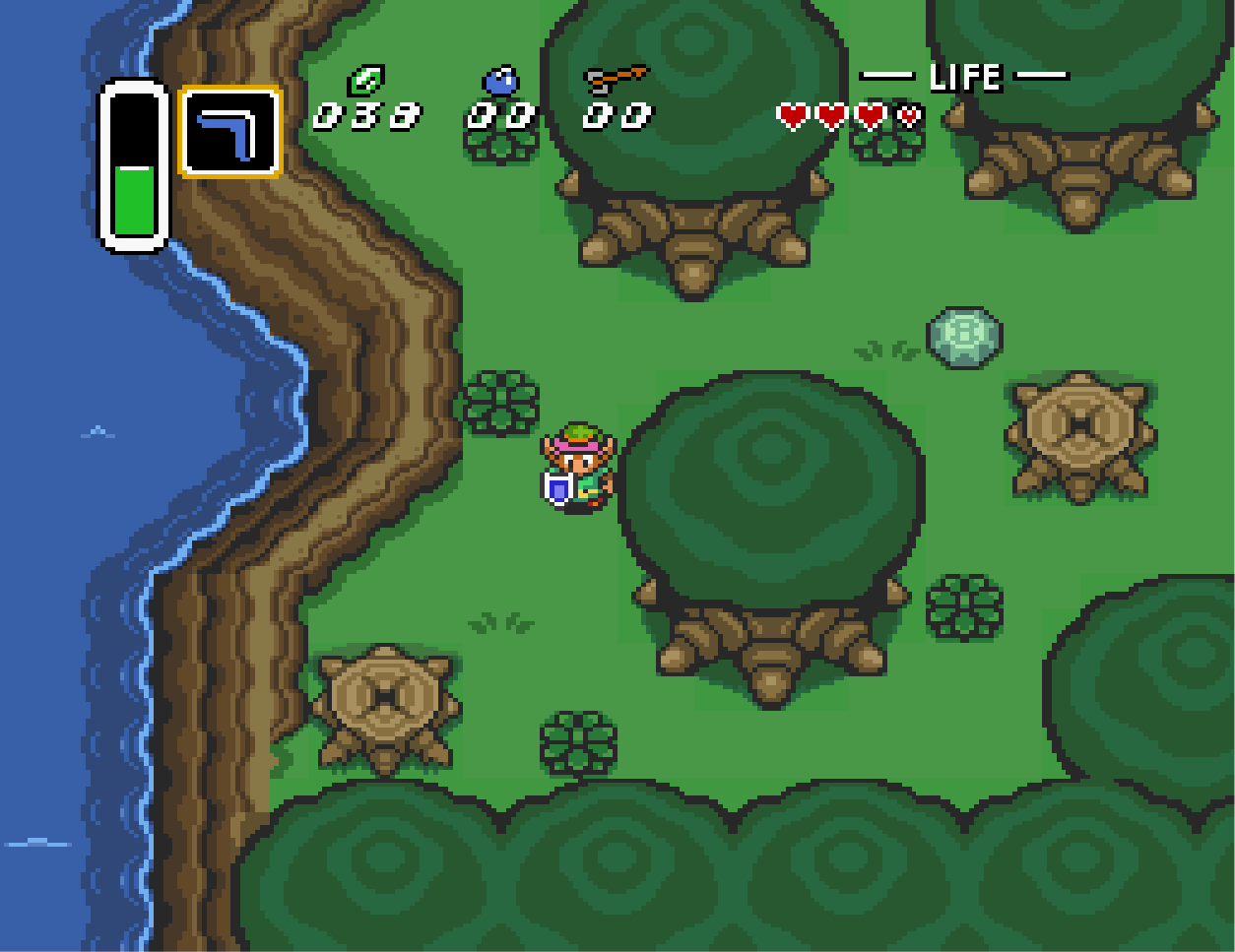
I wanted to capture that same feeling in Glory Hunters. Although it’s inevitable that, eventually, each player will unlock the entire map, I wanted the initial experience to make each player feel that their journey was unique. The way you choose to explore, which paths you unlock first, which NPCs you decide to help, and which achievements you pursue are all designed to make you feel like you’re creating your own story.
Mechanics That Helped Achieve This: Paying Guards to Unlock New Areas
From the earliest prototypes, the mechanic of paying guards to unlock new areas played an important role. This allowed players to choose which routes to explore, adding an element of cost-benefit. If you opened one path, another became harder to unlock or required more achievements to access. In this way, each player built their own route through the game, making the experience unique for everyone.
In early playtests, I noticed something that excited me: different players chose different routes, often based on conversations they’d had with NPCs or simply out of curiosity. This reminded me of the days when we depended on talking to friends to discover secrets in video games. Watching players share their experiences, asking what others had found or where they had gone, confirmed that I had achieved what I was aiming for: an experience where every player felt like they had discovered something unique, even if it was just an illusion.
The Player’s Evolution and Personalized Progression
Main idea: A video game where every activity the player undertakes helps them in their progression.
Bringing all of these experiences together, I realized that I could do something with the achievements: disguise the way the player gained experience, similar to Dragon Quest (I explain a bit more of this here), and allow experience to be earned in different ways, not just by defeating monsters. I thought about how you could generate experience by talking to NPCs, or through other activities like fishing, breaking rocks, or completing quests (similar to World of Warcraft). This would give the player control over how they wanted to earn that experience, making every activity in the game somewhat “optional.”
Ultimately, this meant that if the player wanted to gain more health (for example), they wouldn’t be forced to defeat a final boss, find a hidden upgrade in the world, or go through a dungeon. Instead, they could use the currency earned through the achievements they chose to complete. In video games, players are often presented with restrictions (like the ability to climb a mountain, enter certain areas, or have the right magic to avoid dying in a fight). These restrictions can be disguised by the “freedom” to explore an open world, but they almost always depend on a specific activity. My goal was to expand the possibility of overcoming these restrictions through various activities, rather than limiting it to just one or two options. This led to the following results:
- Player wants more health: Destroy enemies.
- Player wants more health: Talk to more NPCs.
- Player wants more health: Complete more quests.
- Player wants more health: Complete a dungeon.
- Player wants more health: Play minigames or fish.
- Player wants more health: Defeat a boss.
- Player wants more health: Cut lots of bushes or break rocks.
The same would apply to other objectives like advancing through the map, gaining more defense, or dealing more damage.
Mechanics That Helped Achieve This: Items That Reward the Player with Greater Flexibility to Move Around the Map
To be honest, I didn’t feel confident enough to add “items” to the game, fearing it would complicate development further and because of my lack of programming experience. I wanted the sword in the game to be an extension of the player, interacting with the world without needing to open menus to switch items or powers constantly. When thinking about how to make the character grow stronger through this experience, I came up with the idea of creating barriers that could be broken with each upgrade the player obtained in the game (specific plants and rocks that block your path). This would allow players to progress without needing a specific “item” or upgrade. Instead, I would reward players by letting them move faster through the map if they chose to get these upgrades, and even avoid enemies or traps. It would also give them the freedom to explore the map more efficiently.
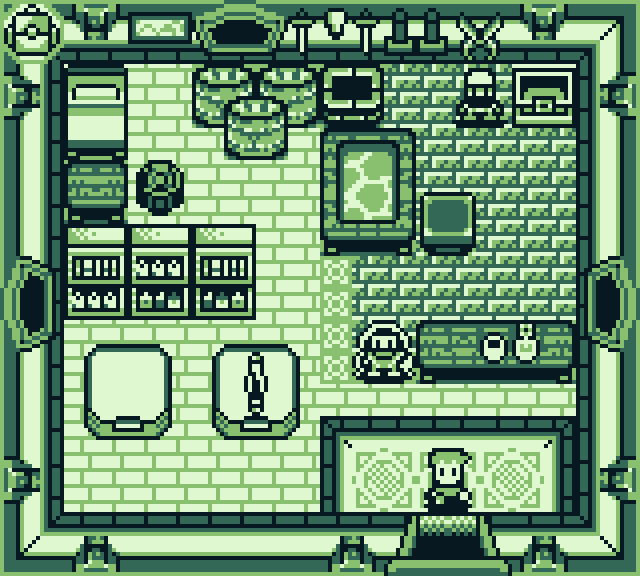
The rewards for obtaining achievements transformed into the ability to access fast travel within the game via caravans, receive help marking points of interest on the map, acquire armor to take less damage, and buy health upgrades (hearts). This allowed players to shape the game's difficulty and experience according to their preferences, as they would decide how to use the currency (glory points) as they saw fit.
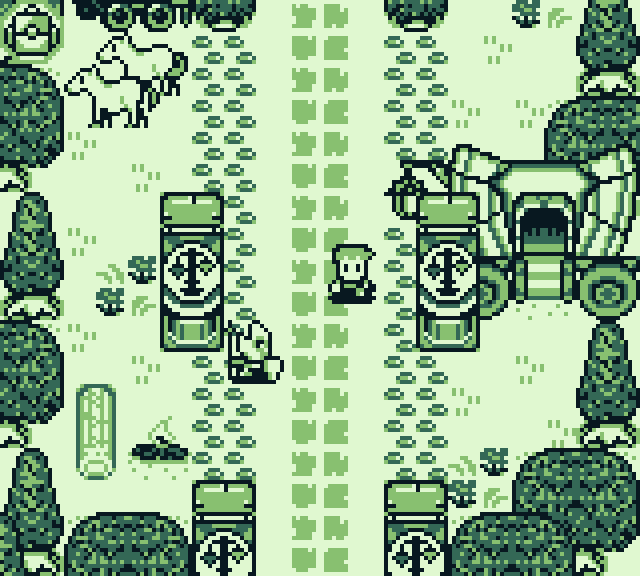
Conclusion
The development process of Glory Hunters has been a journey of learning and experimentation. From the initial ideas about achievements to the evolution of mechanics that break traditional restrictions, I’ve sought to create an experience that gives players control over their progress and makes them feel like every corner of the game holds something unique—something that belongs to them, even if only for a while. While some players will always want to unlock the entire map, the paths they take to get there will differ, reflecting each player's personal decisions.
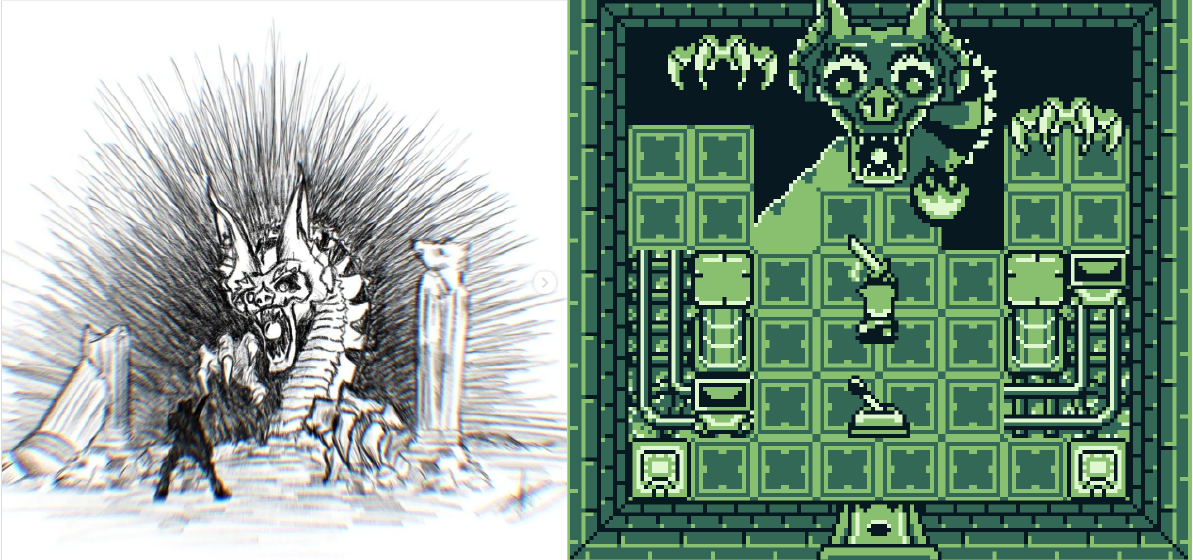
The next entry in this devlog will be: From Concept Art to Pixel Art, where I will show how, although many sprites and backgrounds were created directly as pixel art, some required prior drawings to help me visualize how to abstract and reflect the elements that distinguish the character through pixels.
Feel free to leave a comment or ask about anything I might have missed. I'm always happy to respond to all of you, and thank you for reading!
-César Arminio
------Español------
Cómo se hizo Glory Hunters, Parte 1: Imaginando la experiencia
Siempre me he inclinado a ver al diseñador de videojuegos como alguien que diseña experiencias. Es la persona que crea los "juguetes" con los que luego nos divertimos a través de la pantalla. Define los elementos, las reglas, el control, las restricciones del juego, y luego los pone a disposición del jugador para que este interactúe y transforme esos "juguetes" en algo propio.
Durante el desarrollo y después del lanzamiento de Glory Hunters, varias personas me preguntaron de dónde surgió la idea o cómo comencé a hacer el juego. Esto reafirma lo que siempre he pensado: todo comenzó con la experiencia que yo quería tener como jugador, una experiencia que surgió de la combinación de muchos videojuegos que me marcaron e ideas clave que sentaron la base para la arquitectura del videojuego.
En este devlog describo las ideas detrás de la experiencia que quería crear, de dónde surgieron y cómo finalmente se integraron en el juego. El objetivo de compartir esta información es abrir la puerta a lo que pasaba por mi cabeza durante el desarrollo y compartir los elementos que finalmente se implementaron para que otros desarrolladores puedan evaluar qué funcionó y qué no. Aunque Glory Hunters está lejos de ser un juego perfecto, creo firmemente que estas ideas pueden expandirse, balancearse y enriquecerse para establecer, quizás, las bases de un nuevo subgénero en los RPG de acción y aventura.
Un videojuego que se descubre a través de logros
Idea principal: Un videojuego que se descubre a través de la obtención de logros.
Muchos años jugué World of Warcraft (más de los que me gustaría admitir), y una de las cosas que más disfrutaba eran los logros. Conseguir y presumir estos logros entre otros jugadores era extremadamente gratificante. Había un logro en particular, "Insane in the Membrane", que me tomó mucho tiempo conseguir. Cuando en futuras expansiones ese logro perdió su valor, fue una de las razones por las que dejé de jugar.

Esta idea de logros influyó profundamente en Glory Hunters. En un principio, quería que los NPC dejaran de dirigirse al jugador como "cazador", y que el título con el que los NPC se referían a ti cambiara dependiendo de los logros que ibas obteniendo. Pero finalmente descarté la idea, ya que habría sido complicado implementarlo en todos los diálogos del juego, además de que las limitaciones técnicas del hardware habrían sido un obstáculo importante. Sin embargo, sigue siendo una idea que quiero implementar en un futuro remake o secuela, si es posible.
El sistema de logros es el corazón de Glory Hunters, pero lo que hace único al juego es que no se limita a la típica lista de "misiones" o "tareas" por completar. Quería que cada jugador tuviera la libertad de decidir cómo alcanzar esos logros, si preferían hacerlo explorando, resolviendo puzzles, interactuando con NPCs, o incluso haciendo cosas tan simples como cortar arbustos o pescar. Así, los logros no solo eran un reconocimiento del progreso, sino también una forma de definir quién eras como jugador.

Mécanicas que ayudaron a lograrlo: Llevar un contador de cada acción realizada por el jugador usando variables.
Antes de comenzar con el desarrollo de Glory Hunters, experimenté con un prototipo llamado Blind Rabbit, un pequeño proyecto en el que jugué con la idea de usar variables para rastrear cada acción del jugador. Este prototipo me permitió implementar un sistema en el que los NPCs podían morir o desaparecer después de una cierta cantidad de interacciones con ellos. Cada acción que el jugador tomaba tenía un contador detrás, y esto me permitió empezar a ver el potencial de crear un juego donde cada pequeña decisión del jugador tuviera un impacto en el mundo.

Aunque Blind Rabbit nunca llegó a ser algo más grande, sentó las bases para lo que vendría después en Glory Hunters. El uso de variables me permitió llevar un registro detallado de cada cosa que el jugador hacía: desde cortar arbustos hasta hablar con NPCs. Este sistema fue clave para implementar la mecánica de logros y para crear un mundo que respondiera a las decisiones del jugador, por más pequeñas que fueran.

Rompiendo con las restricciones de los RPG tradicionales
Idea principal: Un videojuego en el que todo (o la gran mayoría de los eventos o lugares a descubrir) pudieran ser opcionales.
Uno de los aspectos que quise cambiar de los RPG tradicionales era la forma en que las restricciones del juego te forzaban a seguir un camino predeterminado. En muchos casos, aunque se te prometía libertad, en realidad estabas atado a ciertas habilidades específicas, objetos o misiones que debías completar para avanzar. Quería que Glory Hunters rompiera con esta estructura para darle más libertades al jugador.
En el juego, si bien existen restricciones, estas pueden superarse de múltiples maneras. No quería que el progreso del jugador dependiera de derrotar a un jefe o completar una mazmorra específica. Al contrario, quería que pudieras obtener logros simplemente explorando, hablando con NPCs, completando misiones secundarias o incluso realizando actividades menores, como pescar o cortar arbustos. Esta flexibilidad le da al jugador la libertad de elegir cómo avanzar y define su experiencia única.

Los jugadores no están restringidos por habilidades u objetos específicos. En Glory Hunters, puedes abrir nuevas rutas pagando a los guardias, pero esto viene con una decisión: desbloquear un camino significa que el otro será más difícil de abrir, a menos que consigas más logros. Esta mecánica de elección y costo-beneficio es algo que disfruté diseñar, ya que le da al jugador un sentido de control sobre su progreso sin dejar de lado los retos que el juego propone.
La ilusión de un mundo único para cada jugador
Idea principal: Un videojuego en el que el jugador pudiera experimentar que su camino fue único o que sintiera que sólo él ha descubierto un rincón dentro de él.
The Legend of Zelda: A Link to the Past fue una de mis mayores influencias. Recuerdo cuando era niño, cómo solía imaginar que había descubierto un rincón secreto del mundo que nadie más conocía. Aunque, en realidad, ese rincón lo habían encontrado millones de jugadores antes que yo, la ilusión de tener algo propio, de haber descubierto algo por mí mismo, era muy poderosa.

Quise capturar esa misma sensación en Glory Hunters. Aunque es inevitable que, eventualmente, cada jugador desbloquee todo el mapa, quise que al principio cada jugador sintiera que su viaje era único. La manera en que eliges explorar, qué caminos desbloqueas primero, qué NPCs decides ayudar y qué logros persigues, todo está diseñado para que sientas que estás creando tu propia historia.
Mécanicas que ayudaron a lograrlo: Pagar a los guardias para abrir nuevas zonas.
Desde los primeros prototipos, la mecánica de pagar a los guardias para desbloquear nuevas zonas jugaba un papel importante. Esto permitía que el jugador decidiera qué rutas explorar, añadiendo un elemento de costo-beneficio. Si abrías un camino, otro se volvía más difícil de desbloquear, o requería más logros para ser accesible. Así, cada jugador construía su propia ruta dentro del juego, lo que hacía que la experiencia fuera única para cada uno.
En las pruebas iniciales, noté algo que me emocionó: diferentes jugadores elegían rutas distintas, a menudo basándose en conversaciones que habían tenido con NPCs o simplemente por curiosidad. Esto me recordó la época en la que no había internet y dependíamos de hablar con amigos para descubrir secretos en los videojuegos. Ver a los jugadores compartir sus experiencias, preguntando qué habían encontrado o hacia dónde habían ido, me confirmó que había logrado lo que buscaba: una experiencia donde cada jugador sintiera que había descubierto algo único, aunque fuera solo una ilusión.
La evolución del jugador y su progresión personalizada
Idea principal: Un videojuego en el que todas las actividades que el jugador lleve a cabo lo ayuden en su progresión.
Al juntar todas estas experiencias, me di cuenta de que podía hacer algo con los logros: disfrazar la experiencia que el jugador podría obtener, al estilo de Dragon Quest (explico un poco mas de detalles aquí), y permitir que la experiencia se obtuviera de diversas formas, no solo destruyendo monstruos. Pensé en cómo podrías generar experiencia hablando con los NPC, o a través de otras actividades como pescar, romper piedras o entregar misiones (al estilo de World of Warcraft). Esto daría al jugador el control sobre cómo le gustaría obtener dicha experiencia, haciendo que todas las actividades del juego fueran, de alguna manera, "opcionales".
Al final, esto significaría que si el jugador quisiera obtener más vida (por ejemplo), no estaría obligado a destruir a un jefe final, encontrar una mejora escondida en el mundo o pasar por una mazmorra. En su lugar, podría utilizar la moneda obtenida por los logros que decidiera completar. Comúnmente, en los videojuegos, se presentan restricciones al jugador (como la habilidad de escalar una montaña, entrar a ciertas áreas del juego, o contar con la magia adecuada para no morir al enfrentar a un enemigo). Estas restricciones pueden estar disfrazadas por la “libertad” de explorar un mundo abierto, pero siempre dependen de una actividad específica. Mi objetivo era ampliar la posibilidad de superar estas restricciones mediante distintas actividades, en lugar de limitarla a solo una o dos opciones. Esto llevó a los siguientes resultados:
- Jugador quiere más vida: Destruye enemigos.
- Jugador quiere más vida: Habla con más NPCs.
- Jugador quiere más vida: Entrega más misiones o quests.
- Jugador quiere más vida: Completa una mazmorra.
- Jugador quiere más vida: Realiza minijuegos o pesca.
- Jugador quiere más vida: Destruye a un enemigo final (Boss).
- Jugador quiere más vida: Corta muchos arbustos o rompe piedras.
Lo mismo se aplicaría a otros objetivos como avanzar en el mapa, obtener más defensa, realizar más daño, etc.
Mécanicas que ayudaron a lograrlo: Objetos que recompensaran al jugador obteniendo mayor flexibilidad para desplazarse en el mapa.
Para ser sincero, no me sentía lo suficientemente confiado para añadir “ítems” dentro del juego, por miedo a complicar más el desarrollo y debido a mi carencia de experiencia en programación. Quería que la espada en el juego fuera una extensión del jugador para interactuar con el mundo y evitar abrir menús para cambiar ítems o poderes constantemente. Al pensar en cómo podría hacer que el personaje se fortaleciera gracias a esta experiencia, se me ocurrió crear barreras que pudiera romper con cada mejora que obtuviera en el juego (plantas y rocas específicas dentro del juego que bloquean el camino del jugador). Esto permitiría que el jugador no estuviera condicionado a obtener un "ítem" o mejora específica para seguir avanzando. En lugar de eso, recompensaría al jugador permitiéndole desplazarse más rápido por el mapa si decidía obtener estas mejoras, e incluso evitar enemigos o trampas. También le daría la libertad de moverse por el mapa sin estar atado a la necesidad de un objeto específico para seguir avanzando.

Las recompensas de obtener logros se transformaron en la posibilidad de acceder al viaje rápido dentro del juego, a través de caravanas, recibir ayuda para marcar puntos de interés en el mapa, obtener una armadura para recibir menos daño, y comprar mejoras de vida (corazones). Esto permitió moldear la dificultad y la experiencia de juego según el criterio de cada jugador, ya que ellos serían quienes decidirían cómo usar la moneda (puntos de gloria) a su gusto.

Conclusión
El proceso de desarrollo de Glory Hunters ha sido un viaje de aprendizaje y experimentación. Desde las ideas iniciales sobre logros hasta la evolución de las mecánicas que permiten romper las restricciones tradicionales, he tratado de crear una experiencia que dé al jugador control sobre su progreso y lo haga sentir que cada rincón del juego tiene algo único, algo que les pertenece, al menos por un tiempo. Aunque siempre habrá jugadores que quieran abrir todo el mapa, las rutas que toman para llegar allí serán distintas, reflejando las decisiones personales de cada uno.

La siguiente entrada de este devlog será: Del arte conceptual al pixelart, donde mostraré cómo, aunque muchos sprites y fondos fueron creados directamente como pixelart, algunos requirieron dibujos previos para ayudarme a visualizar cómo realizaría la abstracción y reflejar los elementos que distinguen al personaje a través de los pixeles.
Siéntete libre de dejar un comentario o preguntar sobre cualquier cosa que quizá haya pasado por alto. Siempre estoy feliz de responderles a todos, ¡y gracias por leer!
-César Arminio
Files
Get Glory Hunters
Glory Hunters
Action-Adventure RPG like no other! Ready for the hunt? Game Boy / Analogue pocket
| Status | Released |
| Author | 2think design studio |
| Genre | Adventure, Role Playing |
| Tags | 8-Bit, Action-Adventure, analogue-pocket, Game Boy, Game Boy ROM, Homebrew, Pixel Art, Retro, Top Down Adventure |
| Languages | English |
| Accessibility | Subtitles |
More posts
- ✨April's Glorious Seasonal Secret Event✨Apr 01, 2025
- There is no secret cow level and Zelda secret.Jan 03, 2025
- First Glorious Seasonal Secret Event (Easter Egg)Aug 15, 2024
- Let the hunt begin! Glory Hunters have been released!Jun 08, 2024
- Release Date: June 8th!May 09, 2024
- Gone Gold!Apr 20, 2024
- Save system, collaboration and some of the map showcase.May 09, 2023
- Development Sneak Peek and live stream!Feb 21, 2023
- Before Glory Hunters Part 3: The search for glory.Apr 18, 2022
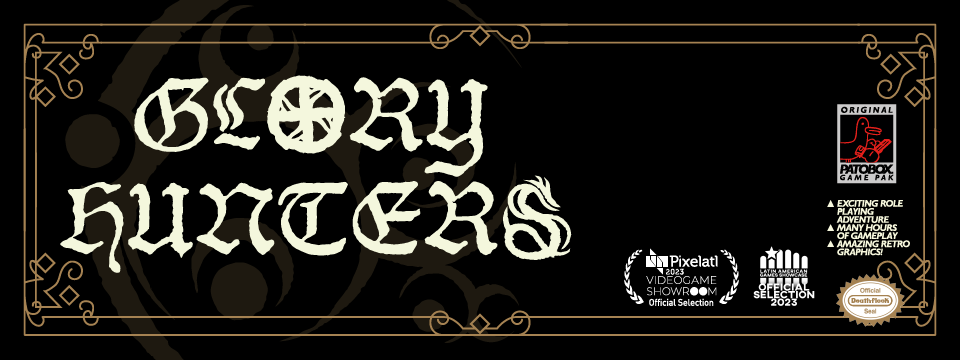
Comments
Log in with itch.io to leave a comment.
the game is a clear example of true passion project, it took some time to finish, but the result is worth it!